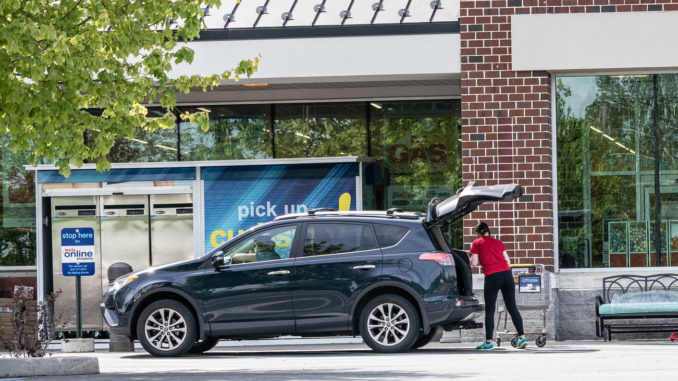
As buyers’ habits change during COVID-19, experts question future impact
By Terry Troy
The coronavirus pandemic has caused a dramatic shift in the retail sector, but some retailers are profiting. Not too surprisingly, major retailers are coming out ahead. For the first fiscal quarter of 2020, Amazon reported sales were up 29% to $46.1 billion, putting CEO Jeff Bezos on track to become the world’s first trillionaire. With the convenience and safety of its home-delivery business model, Amazon was uniquely positioned to take advantage of the restrictions of the pandemic lockdown.
However, Amazon’s good fortune may soon see increased competition from something called “Clicks and Bricks,” a phenomenon where people shop online and then head out to traditional brick and mortar retailers to pick up their purchases. During the pandemic lockdown, people have become more familiar with this retail business model. Target, Walmart and Home Depot are reporting a serious uptick in online shopping and have online “clicks and bricks” infrastructures in place.
Another consumer trend is toward value-oriented home necessity purchases made at deep discount retailers. Last Thursday, the top two U.S. dollar store chains reported better-than-anticipated quarterly sales and profits—benefitting from the surge in demand for affordable groceries and household essentials. Rising unemployment and salary cuts have forced many consumers to look for cheaper alternatives for groceries and clothing that they would otherwise buy at more expensive retailers. Dollar General reported its biggest rise in quarterly sales in 14 years, with net sales rising 27.6% to $8.45 billion, beating analysts’ estimates of $7.61 billion. Same store sales jumped 21.7%. Dollar Tree was hurt by a lack of Easter sales because it carries more seasonal merchandise than Dollar General, but still enjoyed an increase of 8.2% to $6.29 billion in the first quarter. That figure still beat analysts’ expectations of $6.14 billion, sending the retailer’s stock prices upward.
There are some new discernable trends in consumer spending as well. Most are centered on lockdown consumer behaviors.
Adult cycling appears to have become an outdoor activity of choice, and sales are booming. Sales of adult bikes were up over 121% in March alone, according to data from the NPD Group. Wisconsin-based bicycle manufacturer Schwinn also reported a surge in demand, and is only being held back by a lag in its supply chain.
While traditional toy sales have suffered, sales of board games, yard toys and construction toys like Legos are enjoying substantial sales gains. The same is true of puzzles and video gaming—activities that help keep people entertained while in the home. But once again, big box retailers with an online infrastructure in place are coming out on top in terms of sales.
While restaurants, travel and tourism and other small retail businesses are sure to take a hit, they may be more a victim of our national economy switching from being more service oriented to more manufacturing oriented, as larger companies move operations and supply chains back onshore. This could lead to new manufacturing businesses coming online in the months ahead.



